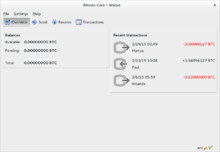Bitcoin Core
 The start screen under Fedora Linux | |
| Original author(s) | Satoshi Nakamoto |
|---|---|
| Initial release | 2009 |
| Stable release | 27.0 (15 April 2024) [±] |
| Repository | github |
| Written in | C++ |
| Operating system | Linux, Windows, macOS |
| Type | Cryptocurrency |
| License | MIT License |
| Website | bitcoincore |
Bitcoin Core is free and open-source software that serves as a bitcoin node (the set of which form the Bitcoin network) and provides a bitcoin wallet which fully verifies payments. It is considered to be bitcoin's reference implementation.[1] Initially, the software was published by Satoshi Nakamoto under the name "Bitcoin", and later renamed to "Bitcoin Core" to distinguish it from the network.[2] It is also known as the Satoshi client.[3] Bitcoin Core includes a transaction verification engine and connects to the bitcoin network as a full node.[3]
The software validates the entire blockchain, which includes all bitcoin transactions ever. This distributed ledger, which has reached more than 608.9 gigabytes (not including database indexes) in size as of October 2024,[4] must be downloaded or synchronized before full participation of the client may occur.[3] Bitcoin Core includes a scripting language inspired by Forth that can define transactions and specify parameters.[5]
The original creator of the bitcoin client has described their approach to the software's authorship as it being written first to prove to themselves that the concept of purely peer-to-peer electronic cash was valid and that a paper with solutions could be written. The lead developer is Wladimir J. van der Laan, who took over the role on 8 April 2014.[6] Gavin Andresen was the former lead maintainer for the software client. Andresen left the role of lead developer for bitcoin to work on the strategic development of its technology.[6] Bitcoin Core in 2015 was central to a dispute with Bitcoin XT, a competing client that sought to increase the blocksize.[7]
Over a dozen different companies and industry groups fund the development of Bitcoin Core.[citation needed] In 2019, MIT announced donations of $900,000 would be used to fund the Digital Currency Initiative, which would mainly go to developers of Bitcoin Core.[8]
References
[edit]- ^ Antonopoulos, Andreas (2017). "3". Mastering Bitcoin: Programming the Open Blockchain (2nd ed.). O'Reilly Media. ISBN 978-1491954386.
Bitcoin Core is the reference implementation of the bitcoin system, meaning that it is the authoritative reference on how each part of the technology should be implemented. Bitcoin Core implements all aspects of bitcoin, including wallets, a transaction and block validation engine, and a full network node in the peer-to-peer bitcoin network.
- ^ "Bitcoin Core version 0.9.0 released". Bitcoin Core. 19 March 2014. Retrieved 21 October 2018.
- ^ a b c Antonopoulos, Andreas M. (2014). Mastering Bitcoin: Unlocking Digital Cryptocurrencies. O'Reilly Media, Inc. pp. 31–32. ISBN 978-1491902646. Retrieved 6 November 2016.
- ^ “Bitcoin Blockchain Size.” n.d. Ycharts.com. https://ycharts.com/indicators/bitcoin_blockchain_size.
- ^ Antonopoulos, Andreas (29 May 2013). "Bitcoin is a money platform with many APIs". Radar. O'Reilly. Retrieved 19 November 2016.
- ^ a b Preukschat, Alex; Josep Busquet (2015). Bitcoin: The Hunt of Satoshi Nakamoto. Europe Comics. p. 87. ISBN 9791032800201. Retrieved 16 November 2016.
- ^ Maria Bustillos (25 August 2015). "Inside the Fight Over Bitcoin's Future". New Yorker. Retrieved 29 June 2020.
- ^ "MIT Announces $900,000 Bitcoin Developer Fund". Inc. 29 March 2016. Retrieved 21 October 2018.
Further reading
[edit]- Kaushal, Puneet Kumar; Bagga, Amandeep; Sobti, Rajeev (July 2017). Evolution of bitcoin and security risk in bitcoin wallets. 2017 International Conference on Computer, Communications and Electronics (Comptelix). IEEE. pp. 172–177. doi:10.1109/COMPTELIX.2017.8003959. ISBN 978-1-5090-4708-6.
- Van Der Horst, Luuc; Choo, Kim-Kwang Raymond; Le-Khac, Nhien-An (2017). "Process Memory Investigation of the Bitcoin Clients Electrum and Bitcoin Core". IEEE Access. 5: 22385–22398. Bibcode:2017IEEEA...522385V. doi:10.1109/ACCESS.2017.2759766. ISSN 2169-3536.
- Groce, Alex; Jain, Kush; van Tonder, Rijnard; Kalburgi, Goutamkumar Tulajappa; Goues, Claire Le (21 May 2022). "Looking for lacunae in Bitcoin core's fuzzing efforts". Proceedings of the 44th International Conference on Software Engineering: Software Engineering in Practice (ICSE-SEIP '22). 44th International Conference on Software Engineering. New York: Association for Computing Machinery. pp. 185–186. doi:10.1145/3510457.3513072. ISBN 978-1-4503-9226-6.
- Brakmić, Harris (2019). "Bitcoin Core Wallet". Bitcoin and Lightning Network on Raspberry Pi. Berkeley, CA: Apress. pp. 141–164. doi:10.1007/978-1-4842-5522-3_5. ISBN 978-1-4842-5521-6. S2CID 213657549.
